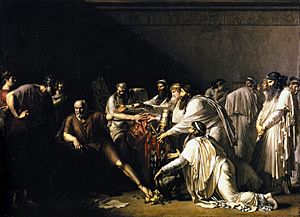Bioethics facts for kids
Bioethics is a special part of philosophy that looks at what is right and wrong in medicine and biology. It helps us think about the ethical, legal, and social questions that come up with new scientific discoveries.
Bioethics helps us decide if new science is "good" or "bad" and why. It considers how these discoveries affect humans, animals, and nature.
Contents
What Does Bioethics Mean?
The word bioethics was first used in 1927 by Fritz Jahr. It comes from two Greek words:
- bios (bios) means "life."
- ethos (ethos) means "moral nature" or "behavior."
So, bioethics is about the "ethics of life."
Why Is Bioethics Important?
Bioethics helps us explore many big questions. It looks at how we make choices about our health and bodies. It also considers how we share important medical resources.
Exploring New Science
Bioethics helps us understand new technologies like:
- Cloning: Making an exact copy of a living thing.
- Gene therapy: Fixing faulty genes to treat diseases.
- Life extension: Ways to live longer.
- Human genetic engineering: Changing a person's genes.
Life Beyond Earth
Bioethics also looks at future ideas. This includes "astroethics," which thinks about life in space. It also considers how we might change basic biology using things like XNA. These new ideas could affect how life evolves in the future.
Main Ideas in Bioethics
When scientists do research involving people, they follow important rules. These rules help protect everyone. The Declaration of Helsinki from the World Medical Association lists key principles:
- Autonomy: This means people have the right to make their own choices. They should also take responsibility for these choices. It's important to respect other people's right to make their own decisions too.
- Beneficence: This means doing good and helping others. Medical research should aim to benefit people.
- Non-maleficence: This means doing no harm. Doctors and researchers must avoid causing harm to people.
- Justice: This means being fair. Everyone should be treated fairly when it comes to medical care and research.
For people who cannot make decisions for themselves, special steps are taken. This ensures their rights and interests are protected.
Related Topics
See also
 In Spanish: Bioética para niños
In Spanish: Bioética para niños
 | John T. Biggers |
 | Thomas Blackshear |
 | Mark Bradford |
 | Beverly Buchanan |


